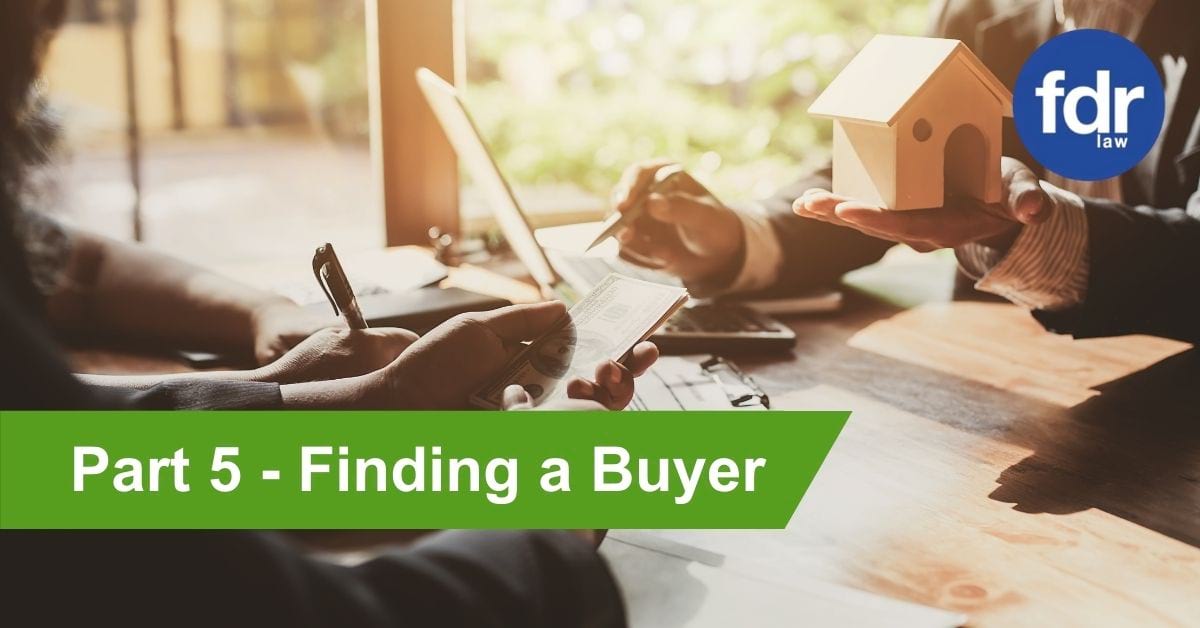
Finding a suitable buyer and presenting the business in its best light are vital to the sale.
Unless you own an outright majority of the company, now is a good time to consult with other shareholders on the valuation of the business in the light of the information gathered and the opinions of your advisers. The value may have gone up or down since you first discussed the sale with them at the very beginning of the process.
If you wish to achieve a sale, you need to market the business effectively. Ensure that your buyers recognise and understand that value. Early consultation with your advisers to create documentation to reflect accurately but positively the nature of your business, its strengths and its assets is crucial.
If there has not been a direct approach that has given you pause for thought in terms of your exit strategy and a Management Buy Out (MBO) is unlikely then potential buyers with sufficient resources to match your valuation must be identified and approached to stimulate interest.
Do not underestimate the amount of work required to not only start the sale process but see it through to completion. If your management team is large enough, it is a good idea to divide its resources – leaving some to concentrate on the continuing performance of the business while others work almost exclusively on the sale.
If a sale falls through, you do not want to return to a business with performance in the doldrums. If the process is prolonged but ultimately successful, you do not want a fall off in performance to give the buyer the opportunity to reduce the original offer price.
Sales documentation
Two main documents need to be drawn up in coordination with your advisers at the outset of the process:
- the first is the Sale or Information Memorandum. This document that outlines all the key details that will attract buyers and maximise the value for your company;
- the second is a Non-Disclosure or Confidentiality Agreement. This legally binds potential buyers from sharing any confidential information which they learn as part of the sale process.
The Information Memorandum will contain:
- basic company profile details,
- information about the sector in which you trade,
- your track record of success,
- all financial figures including turnover, profit and the value of your assets,
- any debts and other liabilities,
- any outstanding litigation.
This list in not exhaustive and will vary from company to company depending on its particular circumstances.
The Information Memorandum is a selling tool. It is your chance to showcase your business drawing attention to any specific strengths, such as unique patents or long-term customer relationships or a performance which outstrips that of comparator companies in your sector.
is your chance to showcase your business drawing attention to any specific strengths, such as unique patents or long-term customer relationships or a performance which outstrips that of comparator companies in your sector.
However, you must ensure that the Information Memorandum does not contain company-sensitive information such as customer names or pricing. This can be discussed with serious potential buyers at a later stage.
The Non-Disclosure Agreement is a legal document to cover the special requirements of a seller’s particular company. It serves as a deterrent to potential buyers sharing any confidential information to which they become party only because of the sale process.
Our team at FDR Law can assist with the preparation of these documents and help steer you through the process.
Identifying potential buyers
Identifying likely buyers for your business is a joint enterprise between you and your management team, if you have taken them into your confidence about the sale, and your corporate advisory team.
You should be able to identify companies that would be likely to meet your valuation of the business because it will benefit their activities.
Factors such as:
- your customer base,
- products,
- skilled employees and
- distribution channels could all be attractive.
You may also know firms interested in investing as an expansion, regionally or internationally, or in the economies of scale you can provide.
Your advisory team will more than likely have a broader view of the market and a wider range of contacts who may be able to add to the list potential buyers you might not have considered, including overseas companies. They can help provide a filter, weeding out those buyers who do not appear able to fund the acquisition of your business and those who may just be on an intelligence gathering trip from a competitor.
You do not want to waste time with buyers who are not serious. On the other hand, having a number of bidders is helpful in achieving a full price. Your team will find a discreet way of letting a bidder know that, in the initial stages, he is not the only one in negotiation.
Alongside your price expectation, you may have other requirements including:
- specific ethical requirements,
- seek protection for your employees or
- guarantees about the long term future of your business.
These issues will be addressed during the negotiation of the Sale and Purchase Agreement.It is as well to remember that once you have banked the buyer’s cheque, the company is no longer yours and it is unlikely to be run in precisely the way you would have managed it.
Not surprisingly, corporate sellers find this an easier issue to resolve than family owners who have an emotional attachment to a business they or their predecessors have built from start-up.
Initial meetings with potential buyers
Every sale is different;Some proceed at a whirlwind pace, some drag on for months and some end in disappointment.
How fast you want to proceed depends a great deal upon how well you know the potential suitors and how open you want to be about the relationship depends on how fully your management team and workforce has been taken into your confidence about the decision to sell.
The sight of a team from your principal competitor strolling round your head office or factory, taking notes is unlikely to go unremarked or to boost morale if you have not carefully prepared the ground. While this may seem self-evident, at an early stage in the process you should operate on the basis that a sale will not go through and you will need the support of managers and workforce to continue to run your business profitably.
For this reason, any potential sale is usually kept confidential and away from employees and most management. However, this adds to your burden in running the process and dealing with the due diligence.
Your advisers can provide considerable help with arranging initial meetings and, indeed, may represent you at those meetings. You may wish to be cautious and wait for an initial or indicative offer before meeting potential buyers and showing them your premises.
The initial stage should end at a deadline set by you and your advisers. By then potential buyers have to:
- refine any indicative offer they have made,
- outlining their proposed price,
- how they will meet any special conditions you have stipulated
- the structure and,
- and timetable for the transaction.
If you want any more information or if you are considering an exit strategy and want some legal advice and assistance then please contact our Head of Corporate, Margaret Evans, Margaret.evans@fdrlaw.co.uk or ring Margaret or another member of our commercial team on 01925 230 000 or visit www.fdrlaw.co.uk
**This article does not present a complete or comprehensive statement of the law, nor does it constitute legal advice. It is intended only to highlight issues that may be of interest. Specialist legal advice should always be sought in any particular case **
